Key takeaways:
- Pro-life advocacy emphasizes empathy and understanding, focusing on supporting individuals facing unplanned pregnancies rather than solely opposing abortion.
- Engaging with legislators through personal narratives can significantly influence policy and foster meaningful dialogue within the pro-life movement.
- Effective communication in advocacy relies on clarity, storytelling, and active listening to build trust and encourage constructive conversations.
- Grassroots efforts and collective voices can lead to tangible successes, demonstrating the power of community in advocating for pro-life initiatives.
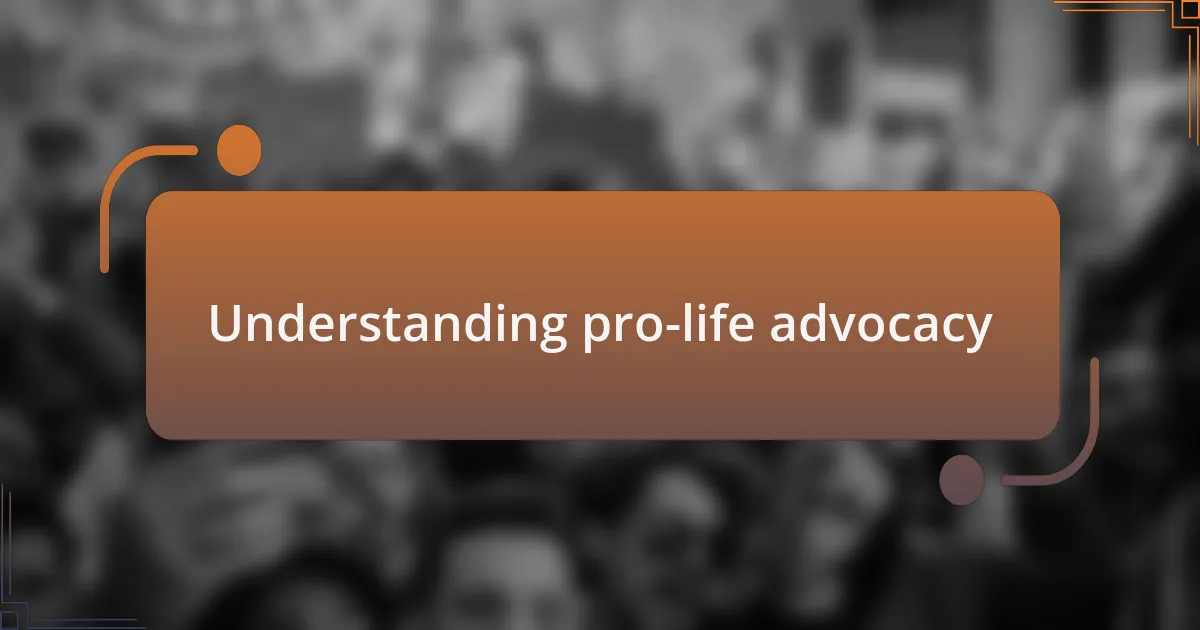
Understanding pro-life advocacy
Pro-life advocacy is more than just a stance on abortion; it’s a movement grounded in a deep respect for life at all stages. When I first became involved, I was struck by the profound emotional stories shared by individuals who had been touched by abortion in some way. Listening to their experiences reminded me of the weight of this issue and the importance of compassion in our conversations.
Being part of this advocacy means understanding the complex layers that surround the right to life. I often find myself pondering why some see this as merely a political issue, rather than a deeply personal one. For those of us who believe in the sanctity of life, it’s about protecting the vulnerable and voicing the silent. These reflections often lead me to question how we can better communicate our views without judgment and with genuine care.
Through my journey, I’ve learned that pro-life advocacy isn’t just about opposition; it’s about offering alternatives and support to those facing unplanned pregnancies. I recall a moment when a woman shared her overwhelming fears about carrying a pregnancy to term, and how we were able to connect her with resources that changed her perspective. This experience taught me that our mission is rooted in empathy, guiding others to make informed choices that honor life.
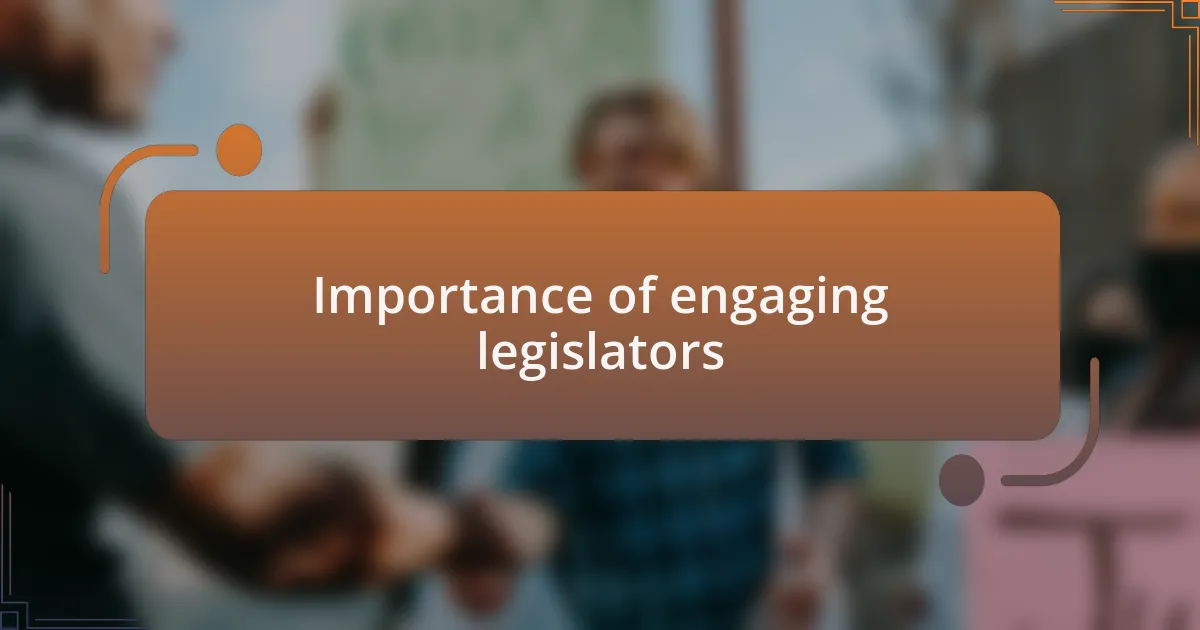
Importance of engaging legislators
Engaging legislators is crucial in the pro-life movement because they hold the power to shape laws that protect life. When I attended a legislative meeting, I was struck by the stark contrast between those who spoke passionately for life and the voices advocating for unrestricted access to abortion. This experience reinforced my belief that every voice in the pro-life community needs to be heard by those in power.
I’ve seen firsthand how relationships with legislators can lead to tangible change. Once, after sharing heartfelt stories during a lobby day, a legislator approached me afterward to express how impacted they were by our narratives. This moment illuminated the importance of personal stories in influencing policy—legislators want to connect with their constituents, and that’s where we, as advocates, can make a difference.
Moreover, engaging with legislators opens doors for meaningful dialogue. It allows us to address misconceptions about the pro-life stance and foster understanding within the political arena. I’ve often wondered, how can we inspire more advocates to take this vital step? From my experience, it’s about making that initial connection, reminding everyone that we share the same goal: ensuring every life has a chance.
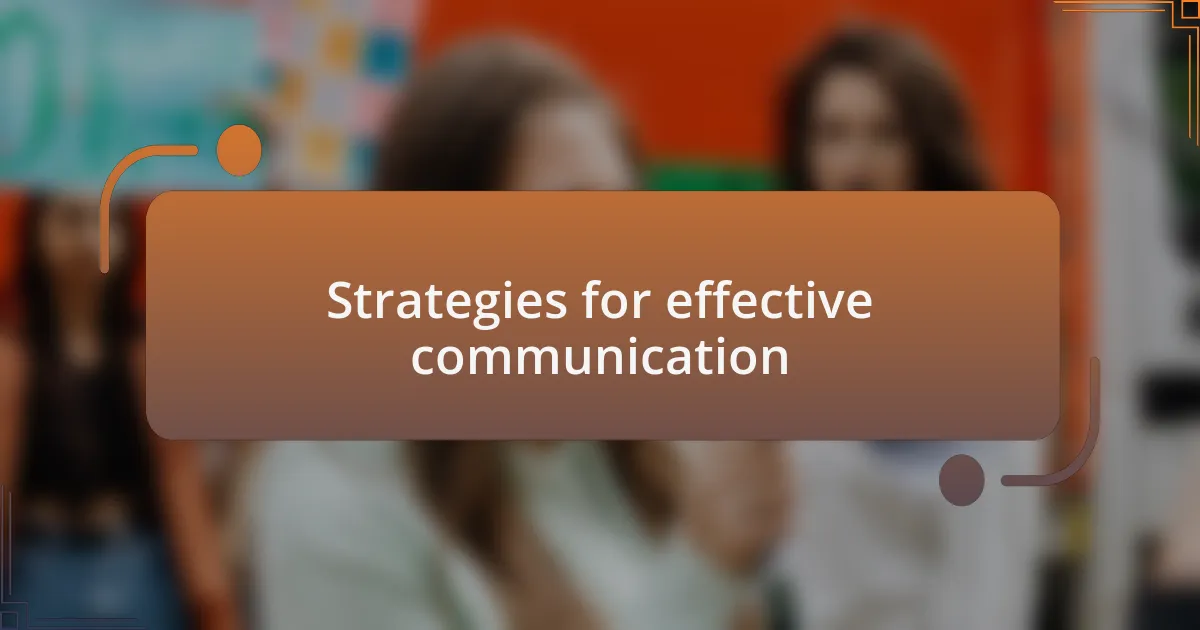
Strategies for effective communication
Effective communication with legislators hinges on clarity and purpose. Once, during a meeting, I learned that being direct about our goals makes a significant impact. I remember clearly how a concise, well-prepared elevator pitch about a crucial piece of pro-life legislation left a lasting impression on a senator who seemed overwhelmed by information from various groups. This experience taught me that brevity often cuts through the noise, making our message more memorable.
Listening is equally essential in this dialogue. I vividly recall an instance where I sat with a legislator who posed challenging questions regarding our stance. Rather than feeling defensive, I embraced the opportunity, listening intently to their concerns. This not only built trust but also allowed me to respond thoughtfully, turning potential conflict into a constructive conversation. How often do we take the time to truly hear our counterparts? In my experience, it’s this mutual respect that paves the way for better outcomes.
Storytelling also plays a pivotal role in connecting with legislators. During one advocacy event, I shared a poignant experience from a friend who faced a difficult pregnancy decision. The room went silent, all eyes focused on me, and I saw the shift in the legislators’ expressions. It became clear that authentic stories resonate deeply, humanizing the issue and reminding them that beyond statistics and legislation are real lives affected by their choices. Can we remember the power of our stories in these conversations? I believe they are what truly drive change.
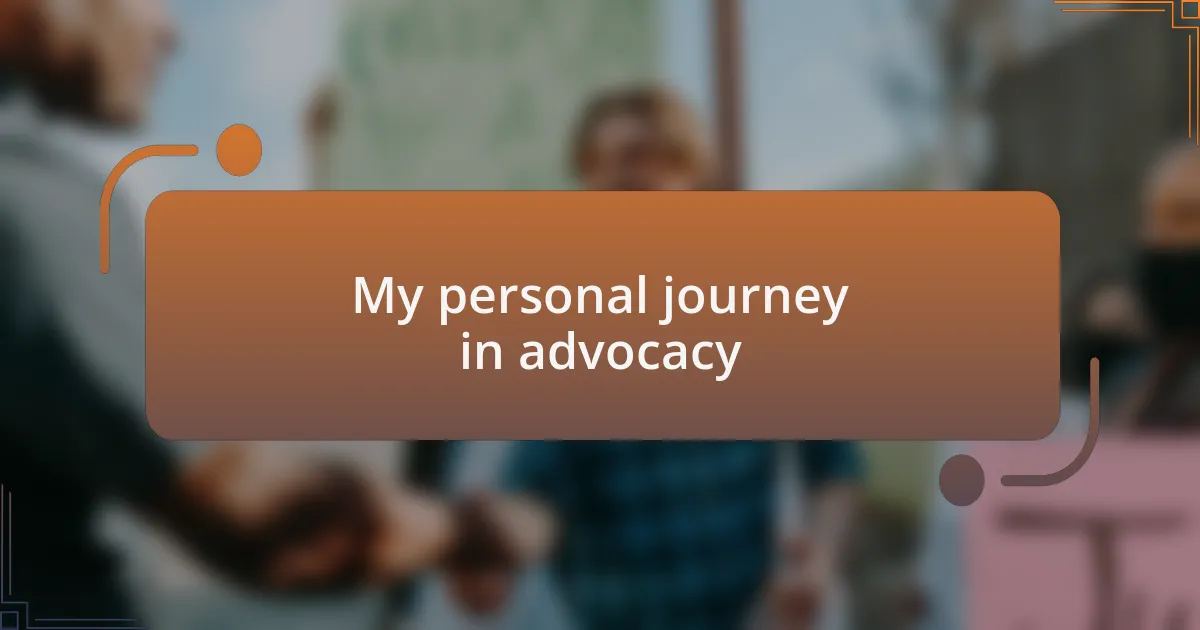
My personal journey in advocacy
When I first stepped into the world of advocacy, I was both eager and uncertain. I recall attending my initial rally, surrounded by passionate individuals who, like me, believed in the importance of protecting life. Yet, it was the moment I held a handmade sign and listened to stories from women who had bravely navigated their own journeys that solidified my commitment. It struck me how sharing our experiences could ignite a fire in others to join the cause.
The first time I met with a legislator, I was nervous. What if I didn’t articulate my thoughts clearly? To calm my nerves, I focused on why I was there. I shared my own story—how witnessing a friend’s heart-wrenching decision inspired me to advocate for life. As I spoke, I could sense a shift in atmosphere; the legislator leaned in, intrigued by my vulnerability. I realized that showing my humanity made me more relatable, and combined with facts, it turned the meeting into a meaningful exchange.
Looking back, I recognize the profound impact of building relationships with legislators. One memorable encounter involved attending a small local forum where I had the chance to engage directly with a representative. Instead of discussing policy, we chatted about community needs, and I saw firsthand how genuine connection paves the way for collaboration. Have you ever considered that advocacy is as much about the heart as it is about the cause? In my experience, it’s these connections that truly drive meaningful change.
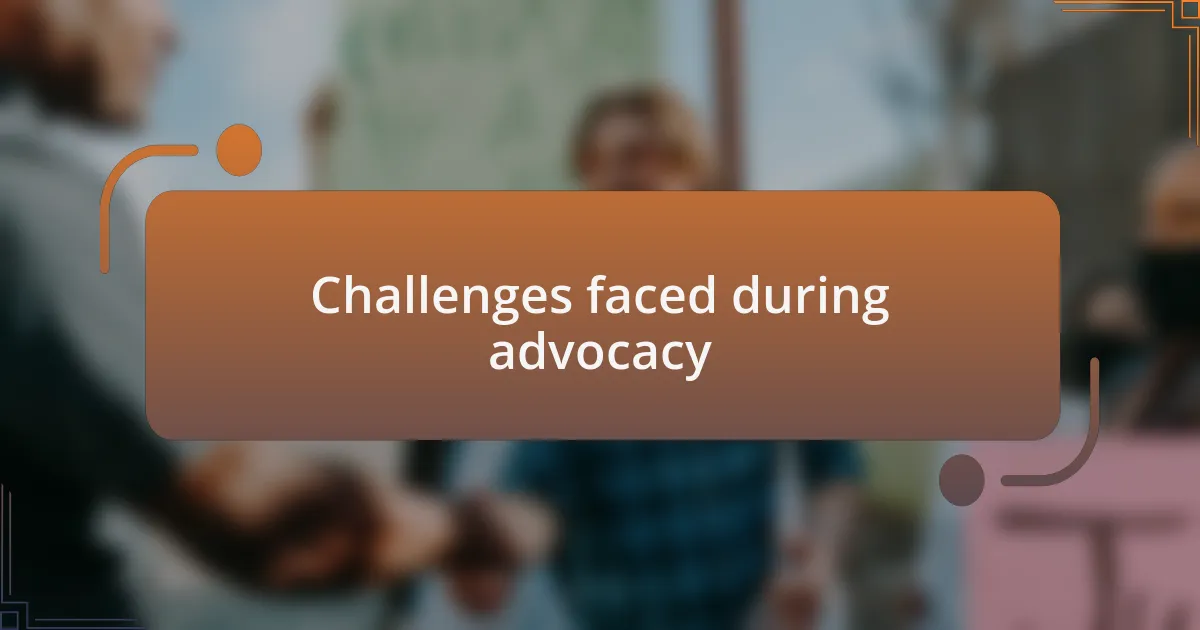
Challenges faced during advocacy
Advocacy work often involves navigating a maze of bureaucratic hurdles. I remember attending a legislative session where I expected to see progress on a pro-life bill, only to find it stalled by political maneuvering. The frustration of watching a cause I care deeply about get postponed because of strategy rather than substance felt disheartening. Have you ever felt the weight of system inefficiencies when you know change is needed?
Emotional resilience is essential, especially when facing opposition. During a heated town hall meeting, I found myself standing amongst passionate opponents who held starkly different views. Their fervor was palpable, and at times, it felt like shouting into the void. Yet, I learned that strength lies in respectful dialogue. I asked myself, how can I turn this clash into an opportunity for understanding? Crafting a message that addresses their concerns while standing firm in my beliefs proved to be a pivotal lesson.
Lastly, timing can be a significant challenge in advocacy efforts. I once organized a rally aimed at influencing forthcoming legislation, only to realize the session was already winding down. It was a moment of panic that taught me the importance of being proactive rather than reactive. I found that educating myself on the legislative calendar and aligning my efforts with key decision-making moments could amplify our voices. Isn’t it fascinating how effective timing can transform an ordinary message into a powerful call to action?
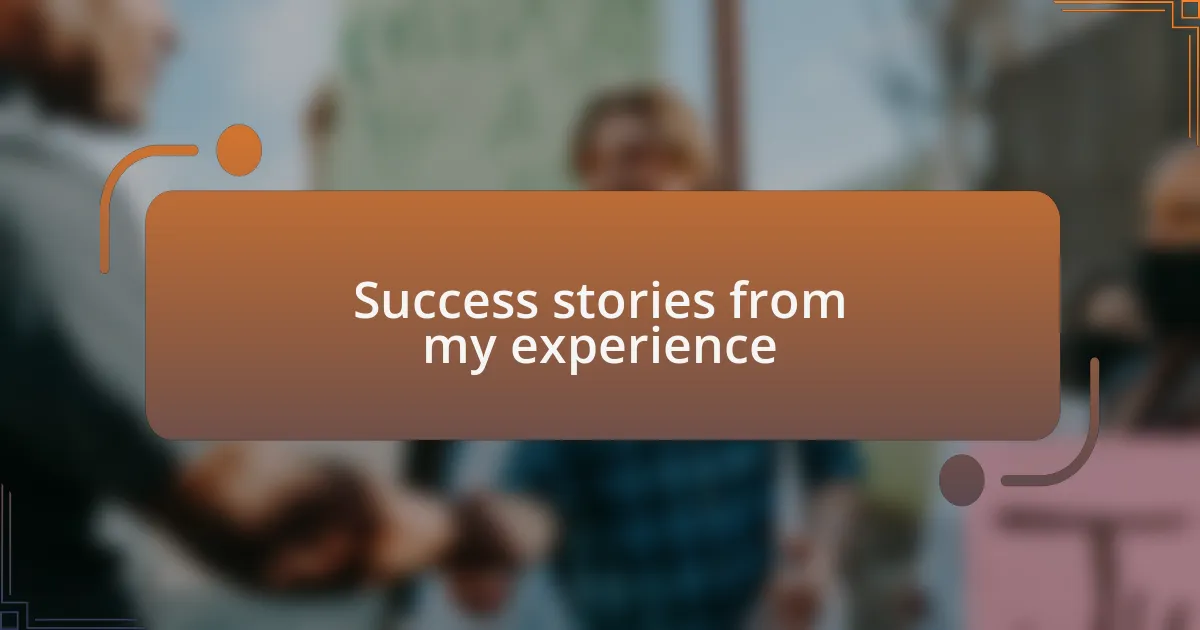
Success stories from my experience
Success stories from my experience often spring from unexpected places. I once collaborated with a local legislator who had reservations about a pro-life initiative. Through numerous discussions and sharing personal stories from those directly affected by abortion, I slowly saw a shift in their perspective. It was not just about convincing someone but fostering an understanding that transformed their stance into support. Have you ever witnessed a mind change like that? The feeling is exhilarating.
One particularly memorable victory came when I spearheaded a grassroots campaign that culminated in a successful passage of a pro-life resolution in our local council. The journey began with a small group of dedicated supporters who knocked on doors, sharing real-life stories of hope. As I stood in that packed council chamber, listening to testimonies from those impacted, I realized the power of collective voices. I remember looking around at my fellow advocates, fueled by shared passion and commitment. Isn’t it remarkable how a simple idea can gather strength and lead to real change?
Reflecting on these moments, I often think about the emotional highs and lows of the advocacy journey. One of my proudest achievements occurred when a young mother approached me after a community event, thanking me for sharing her story about choosing life. Her words reminded me that our efforts resonate beyond legislative victories—they inspire and empower individuals. Can you imagine the impact when someone’s life is changed because they felt supported and understood? That connection is what keeps me motivated.